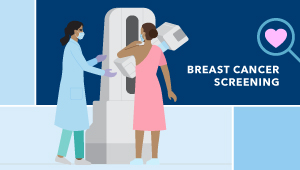Improving cancer prevention and early detection

How KPWHRI is contributing to better cancer screening and better outcomes for patients
More than 40% of cancer cases are potentially avoidable, according to data from the American Cancer Society. For those that are more difficult to prevent, catching the cancer early is one of the best ways to improve outcomes. Cancer screening can both detect precancers and help recognize cancer in the early stages.
At Kaiser Permanente Washington Health Research Institute (KPWHRI), researchers are finding ways to improve cancer prevention measures — from testing interventions to improve lung cancer screening adherence to identifying factors that drive inequities in breast imaging, and more. Incorporating patient-centered approaches, researchers at KPWHRI are working to make cancer screening more equitable, effective, and successful. In recognition of National Cancer Prevention Month, here are highlights of our current work.
Improving adherence to lung cancer screening
Lung cancer is a leading cause of cancer deaths in the U.S., and screening for lung cancer has the potential to provide a huge benefit to public health by helping to detect cancer at an early stage. However, for early detection to be successful, screening must take place annually for people at high risk. These annual screenings could reduce lung cancer mortality by 20% at the population level.
A team of researchers at KPWHRI launched a study in December 2022 to test multi-level interventions to improve adherence to lung cancer screening. They developed the interventions in collaboration with a patient advisory board, using a human-centered design approach to understand challenges to screening delivery and barriers from the patient's perspective. The patient advisory board provided in-depth feedback throughout, meeting regularly with researchers to discuss study methods and execution. The study will test a short video to address gaps in awareness about screening and fears about cancer being detected, and the researchers are also testing stepped reminders that notify patients directly when they are due for a screening.
The study will compare the interventions used separately and together, with the aim of understanding their effectiveness in improving adherence to screening and gaining insight on patient-centered outcomes like reports of knowledge and stigma as well as clinic outcomes like team members’ experiences with the interventions. This is the first clinical trial to date to evaluate multilevel strategies for improving adherence to lung cancer screening in the U.S. and exemplifies KPWHRI researchers' commitment to patient-centered research that can directly impact health and the patient experience.
Long-term research on breast cancer prevention
KPWHRI has been studying how to provide life-saving breast cancer screening for decades. As part of the national Breast Cancer Surveillance Consortium (BCSC), which began in 1994, the institute is able to study breast cancer data from a representative sample of more than 2 million people from around the U.S. The BCSC is a network of 8 breast imaging registries across the country working together to advance equitable risk-based breast cancer screening and surveillance in community practice, and the BCSC Statistical Coordinating Center, located at KPWHRI, is the BCSC hub for data processing, management, analysis, and sharing.
In 2023, researchers at KPWHRI will be working on several projects as part of the BCSC. The studies are focused on developing equitable risk models for identifying people with an increased risk of advanced breast cancer, pinpointing factors that drive inequities in breast imaging performance and outcomes, exploring how artificial intelligence can improve these outcomes, and reducing surveillance imaging failures among people with breast cancer.
Making cervical cancer testing more accessible
Researchers and affiliate investigators at KPWHRI are also leading work to make screening for cervical cancer easier and more accessible. They first tested the idea of mailing home kits that test for human papillomavirus (HPV), the virus that causes nearly all cervical cancers, to people who were overdue for screening. They found that doing so led to a 50% increase in screening when compared to offering exams in the office.
Now they are following up on that study with research testing the comparative effectiveness of either mailed education information, mailed education information plus home HPV self-sampling kits, or mailed education plus the option to request a home screening kit. This work, in collaboration with the University of Washington and the University of Texas, could help pave the way for approval of home HPV tests in the U.S. — although the home kits are in use in other countries, they are not yet approved by the U.S. Food and Drug Administration.
Improving cancer screening in community settings
Since 2011, KPWHRI has been involved in a national screening consortium called PROSPR (Population-based Research to Optimize the Screening Process), which is now focused on evaluating and understanding how to improve the cancer screening process for cervical, colorectal, and lung cancers. Researchers at the institute are principal investigators for the cervical cancer and colorectal cancer multi-site PROSPR Research Centers, funded by the National Cancer Institute over 5 years. Their work focuses on understanding how to measure and improve screening quality and evaluate screening benefits and harms for different groups of patients.
Recent PROSPR work includes research examining how cancer screening harms are reported in U.S. screening guidelines. Researchers concluded that improved harms reporting could help with informed decision-making about screening and improve screening delivery, and pointed out opportunities for changes in the guidelines to achieve these goals. In another study, researchers provided useful data on colorectal cancer risk that can help older adults make informed decisions about whether or not to undergo screening in the future.
Learn more about KPWHRI’s cancer research projects, including research on prevention and screening as well as treatment and survivorship.
By Amelia Apfel
Co-designing with patients

Patient collaboration sparks care innovations
By partnering with patients, KPWHRI researchers developed 2 new interventions to boost lung cancer screening.
Cancer Research

Research funded to improve cancer screening
Drs. Kamineni and Chubak are among leaders of 2 new large PROSPR awards from NCI for cervical and colorectal cancer screening research.
Read it in News and Events.
Research

Roundup of 3 recent studies on breast cancer screening
New research spotlights overdiagnosis, MRI before surgery, and a new way of predicting breast cancer risk
Healthy findings blog

Improving reporting of cancer screening harms
Aruna Kamineni, PhD, MPH, discusses her recent study on how guidelines report screening risks.


